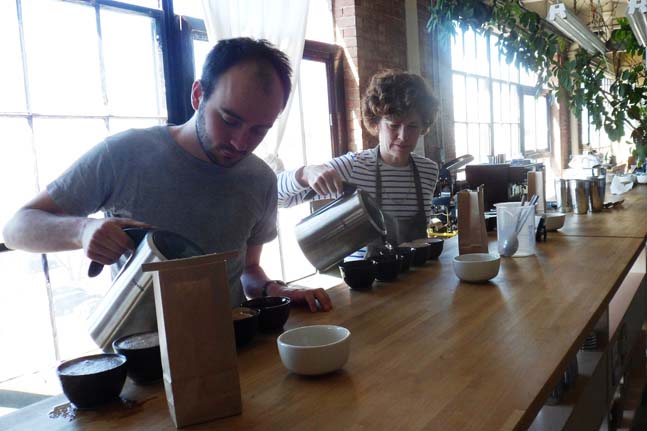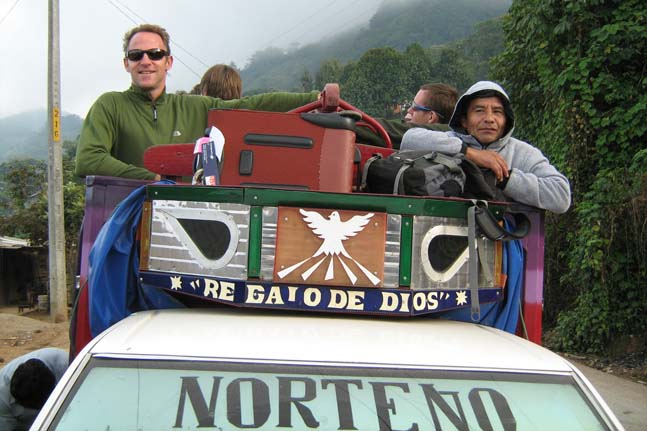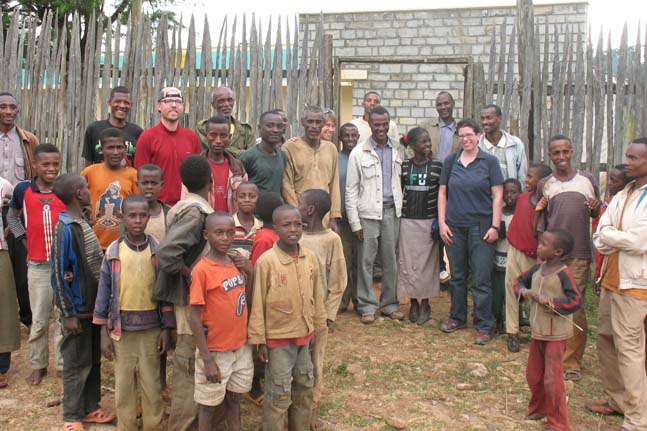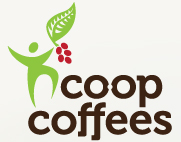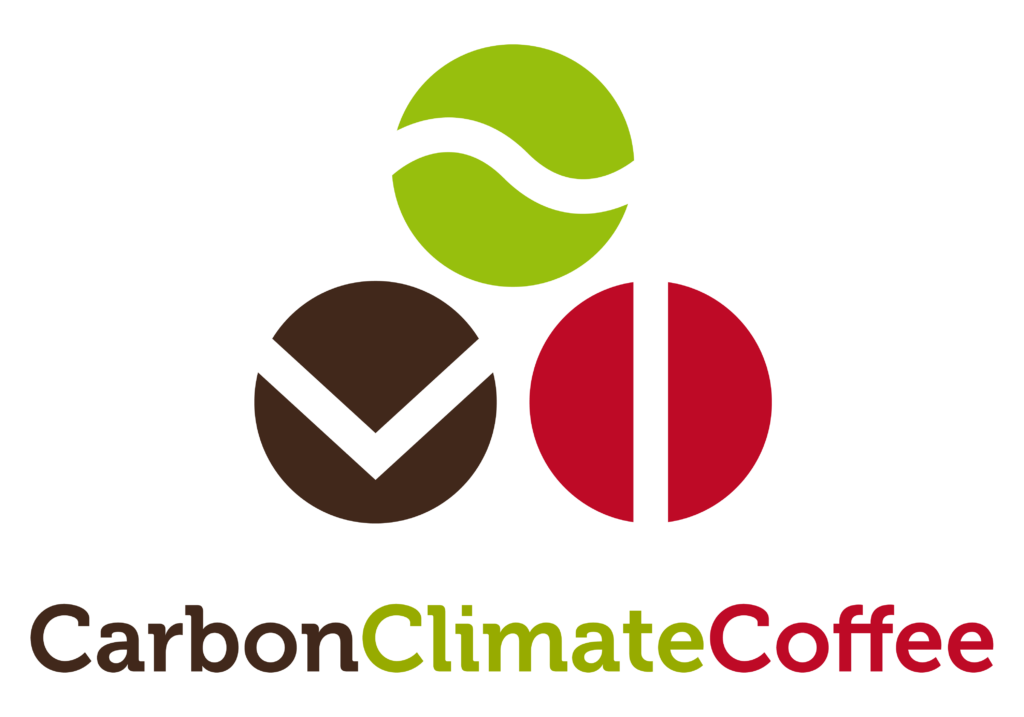
On the heels of a successful, learning workshop with more than 40 farmer and coffee roaster representatives focused on the use and potential of the Cool Farm Tool, Coop Coffees will be launching several pilot experiences in tracking total carbon draw-down in organic coffee farmer plots in Peru, Guatemala, Honduras and Mexico.
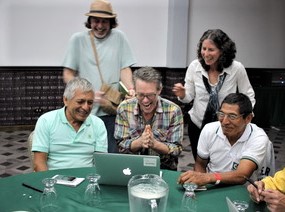 The Cool Farm Tool facilitates the collection of farmer information through tablet apps or an on-line platform, making it simple to digitalize and aggregate the data. As a new member to the Cool Farm Alliance, CoopCoffees will be able to promote practical applications of this tool in the field, and highlight top-performing coffee producers, who are implementing a mix of best, “regenerative-organic” practices on his or her land-holdings.
The Cool Farm Tool facilitates the collection of farmer information through tablet apps or an on-line platform, making it simple to digitalize and aggregate the data. As a new member to the Cool Farm Alliance, CoopCoffees will be able to promote practical applications of this tool in the field, and highlight top-performing coffee producers, who are implementing a mix of best, “regenerative-organic” practices on his or her land-holdings.
Within the current framework of CoopCoffees initiative Carbon, Climate and Coffee, identifying certain levels of carbon-sequestration will also lead to an additional “carbon premium” to be paid directly to these exemplary farmers – via their respective producer cooperatives — to compensate for the environmental services they provide.
The Cool Farm Tool is a << farm practices and resource management calculator >> that allows farmers to measure their environmental impact (positive or negative). This innovative tool will enhance their individual and collective capacity to diagnose, plan, train, and track their progress in applied regenerative, organic practices at the farm level, and to better illustrate a menu of practical options that could improve a farmer’s environmental footprint and overall farm-management “score.”
 By supporting farmer access to this science-based tool, we at CoopCoffees — in close collaboration with participating coffee-producer partners, Root Capital, CFA / Sustainable Food Lab and the Chain Collaborative – expect to co-create a flexible “road-map” that promotes most-promising regenerative practices across a variety of local and regional contexts.
By supporting farmer access to this science-based tool, we at CoopCoffees — in close collaboration with participating coffee-producer partners, Root Capital, CFA / Sustainable Food Lab and the Chain Collaborative – expect to co-create a flexible “road-map” that promotes most-promising regenerative practices across a variety of local and regional contexts.
Industrial agricultural is a primary contributor of total greenhouse gas emissions worldwide. But while industrial farming is a big part of the CO2-emissions problem, small-scale, organic coffee farmers offer a significant solution to current, global, climate-change challenges. Organic coffee plots, managed as agroforestry systems, imitate forest habitats that sustain plant and animal species, and that are capable of sequestering and maintaining high levels of soil organic carbon (SOC).
 In order to mitigate anthropogenic (human-caused) climate change in the coffee industry and to support the livelihoods of small-scale, organic, coffee-farming families around the world – farmers urgently need access to technical and financial resources that encourage them to transform their fields into soil-carbon sequestering ecosystems, and simultaneously increase their quality and productivity. With the Cool Farm Tool, we expect to improve understanding across the supply-chain of the positive impact that regenerative, carbon-sequestering organic practices (enhanced composting, encouraging proper cover crops or mulching, replicating agroforestry models in their coffee plantations, etc.) and best management of organic wastes (coffee pulp, pruning and weeding residue, water runoff, etc.) can bring to the health and productivity of their fields. The Cool Farm Tool helps to illustrate and validate the environmental impact of many “down to earth solutions for climate change” that can resonate with farmers and buyers alike.
In order to mitigate anthropogenic (human-caused) climate change in the coffee industry and to support the livelihoods of small-scale, organic, coffee-farming families around the world – farmers urgently need access to technical and financial resources that encourage them to transform their fields into soil-carbon sequestering ecosystems, and simultaneously increase their quality and productivity. With the Cool Farm Tool, we expect to improve understanding across the supply-chain of the positive impact that regenerative, carbon-sequestering organic practices (enhanced composting, encouraging proper cover crops or mulching, replicating agroforestry models in their coffee plantations, etc.) and best management of organic wastes (coffee pulp, pruning and weeding residue, water runoff, etc.) can bring to the health and productivity of their fields. The Cool Farm Tool helps to illustrate and validate the environmental impact of many “down to earth solutions for climate change” that can resonate with farmers and buyers alike.
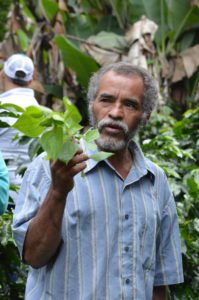 And finally, tracking and reporting on small-scale and organic coffee farmer progress in these areas allows producer organizations to showcase their top performers as: “climate-heroes” and “farm-based technology innovators.” As we move this initiative forward, we will be better positioned to provide real-time information to engaged coffee roasters and help communicate to a broader consumer base the role that regenerative, small-scale coffee farmers play in the struggle against the devastating impacts of runaway climate change, and to acknowledge our collective responsibility to support their efforts. We hope this will encourage further investment in these “carbon-smart” farmers and the environmental services they provide to us and to the planet at large.
And finally, tracking and reporting on small-scale and organic coffee farmer progress in these areas allows producer organizations to showcase their top performers as: “climate-heroes” and “farm-based technology innovators.” As we move this initiative forward, we will be better positioned to provide real-time information to engaged coffee roasters and help communicate to a broader consumer base the role that regenerative, small-scale coffee farmers play in the struggle against the devastating impacts of runaway climate change, and to acknowledge our collective responsibility to support their efforts. We hope this will encourage further investment in these “carbon-smart” farmers and the environmental services they provide to us and to the planet at large.
Author: Monika Firl
April 4, 2019


